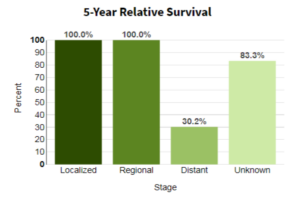
About 23,000 U.S. men die from prostate cancer every year, yet the disease can be found early when it’s highly curable.
So why do so many men die from this cancer?
“Despite the well-known and relatively available opportunities for the early detection of prostate cancer with the development of the prostatic specific antigen blood test since 1979, many men still avoid or ignore this opportunity,” explains Michael D. Lutz, MD, board certified urologist with Corewell Health/Beaumont Hospital; President, MIU Men’s Health Foundation.
“Most men don’t understand or appreciate the benefits of early detection,” continues Dr. Lutz.
“Some are confused in the messaging as a result of the USPSTF, and many just believe that it just does not pertain to them.”
USPSTF is the U.S. Preventive Services Task Force. It actually recommends against PSA-based screening for prostate cancer.
Many men, upon coming upon this information, will then neglect to get an annual PSA count.
But fact is, the estimated number of men who will die from prostate cancer in the U.S. for 2017 is 23,730 – according to the National Cancer Institute Surveillance, Epidemiology and End Results Program.
Dr. Lutz says it best: “The reality is that prostate cancer can kill you, especially if diagnosed later in its course and if you are of African descent.”
This doesn’t mean that being white is protective against prostate cancer.
It simply means that for unknown reasons, more blacks than whites are diagnosed with it.
U.S. blacks are 1.67 times more likely to be diagnosed with this disease than are whites. They are 2.24 times more likely than whites to die from prostate cancer.
These statistics exclude Hispanics, American Indians, Asians and other races that do not fall under the classic category of Caucasian.
“Early detection and beginning at the appropriate age based upon your risk factors is essential to avoid becoming a statistic,” says Dr. Lutz.
How does prostate cancer kill?
Prostate cancer leads to death primarily through its progression and complications.
Initially, cancer may grow slowly and remain confined to the prostate, but it can metastasize to nearby tissues or distant organs like bones and lymph nodes.
This spread can disrupt critical functions, cause severe pain and lead to complications like spinal cord compression or fractures.
Additionally, advanced prostate cancer can impair the body’s ability to manage fluids and electrolytes, leading to lethal kidney failure or sepsis.
As the disease progresses, overall health deteriorates, making the body less able to cope with infections, organ failure and other life-threatening conditions.
When prostate cancer is diagnosed early, the prognosis is excellent.

Five-year relative survival for prostate cancer









































